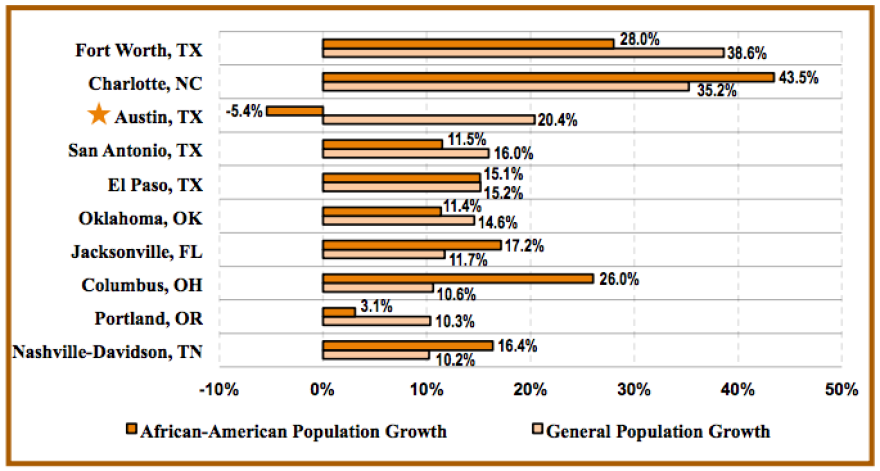The overall Austin population exploded between 2000 and 2010, growing by more than 20 percent. But a University of Texas study [PDF] finds that Austin was the only U.S. city experiencing double-digit population growth that saw its African-American population not only not keep pace, but actually decline.
"Among the ten fastest-growing major cities in the United States, Austin stood out in one crucial respect: it was the only such city that suffered a net loss in its African- American population," says study author Dr. Eric Tang. "Indeed, between 2000 and 2010, Austin was a statistical outlier; it was the only major city in the United States to experience a double-digit rate of general population growth coincident with African-American population decline."
Some of the reasons for the decline are believed to be the gentrification of Central East Austin in recent decades, leading to rising property values and property taxes, and additional factors like public education, employment and high-profile incidents involving Austin Police. Tang tells Texas Standard host David Brown that what’s most troubling about this story is how it doesn't square with Austin’s reputation as a tolerant, liberal city.
"It is the history of segregation of the African-American community in Austin, followed by an intense period of gentrification of the neighborhoods to which they were segregated," Tang says. "In 1928 the City of Austin created what it called the Negro district just east of downtown. The gateway today is Franklin Barbecue for those people familiar with Austin. The city effectively pushed 80 percent of the black population – which before 1928 lived all over Austin – into this segregated district within two years. Fast forward to 1990s, early 2000s – that same area became prime real estate for developers for new development."

Many African-Americans have moved out of Austin entirely, to adjacent cities. Tang says that demands a closer look at issues other than gentrification, including public education, policing and the job market.
"In all three areas what we believe is that African-Americans face persistent inequalities," Tang said. "In the Austin Independent School District, many parents I have talked to anecdotally in our research have … argued that their grandchildren and children are receiving an inferior education to what they got in the post-Civil Rights years."
Tang added that African-Americans have a troubled history with the Austin Police Department. "In 2004, the NAACP filed a civil rights complaint for excessive use of force against African-Americans which led to a Department of Justice investigation. That investigation coincided with that decade in which we lost so much of our black population in Austin."
Hear suggestions from Tang on addressing Austin's situation in the interview:





